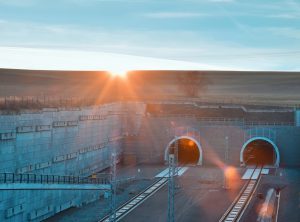 The Czech railway infrastructure manager, SZ, and DB Netz concluded an agreement with IMM Maidl & Maidl Beratende – Ingenieure GmbH & Co for accompanying planning expert activities during the construction of the Ore Mountains tunnel (Krusnohorsky rail tunnel), part of the Prague-Dresden high-speed railway line.
The Czech railway infrastructure manager, SZ, and DB Netz concluded an agreement with IMM Maidl & Maidl Beratende – Ingenieure GmbH & Co for accompanying planning expert activities during the construction of the Ore Mountains tunnel (Krusnohorsky rail tunnel), part of the Prague-Dresden high-speed railway line.
The contractor will prepare an evaluation of the scope of performed surveys and analytical activities, evaluate these outputs, and make recommendations for the design of the underground work.It will also compare the advantages of using possible excavation methods, such as different types of punching shields or the possibility of conventional excavation with shotcrete for individual parts and variants of the tunnel.
During the construction works for Ore Mountains rail tunnel, the supplier will verify the compliance of the encountered and expected characteristics of the rock environment, adjust the excavation procedure according to the state and will prepare ongoing revision opinions of the excavation technology.
The two rail infrastructure managers announced that they have completed another of the planned public contracts to ensure project preparation for the cross-border part of the new Dresden-Prague railway connection.
As with other similarly focused contracts, not only cooperation with foreign experts with experience in European tunnel construction will be ensured, but also the direct participation of experts familiar with national procedures in the Czech Republic from among authorized persons.
In January 2021, the Ministry of Transport approved the feasibility study of the Prague-Dresden high speed connection which will allow trains to run at a speed of 320km/h. The project covers two important elements: the Středohorský (Central Bohemian Uplands) tunnel with a length of 18 km and the Krusnohorsky rail tunnel which will be 26 km-long of which 11.7 km will be constructed in the Czech Republic. The first tunnel will allow trains to run at a speed of 250 km/h, while the second one will be crossed by the trains at a speed of 200 km/h.
The Czech railway infrastructure manager, SZ, and DB Netz concluded an agreement with IMM Maidl & Maidl Beratende – Ingenieure GmbH & Co for accompanying planning expert activities during the construction of the Ore Mountains rail tunnel (Krusnohorsky rail tunnel), part of the Prague-Dresden high-speed railway line.
The contractor will prepare an evaluation of the scope of performed surveys and analytical activities, evaluate these outputs, and make recommendations for the design of the underground work.It will also compare the advantages of using possible excavation methods, such as different types of punching shields or the possibility of conventional excavation for individual parts and variants of the tunnel.
During the construction works for Ore Mountains rail tunnel, the supplier will verify the compliance of the encountered and expected characteristics of the rock environment, adjust the excavation procedure according to the state and will prepare ongoing revision opinions of the excavation technology.
The two rail infrastructure managers announced that they have completed another of the planned public contracts to ensure project preparation for the cross-border part of the new Dresden-Prague railway connection.
As with other similarly focused contracts, not only cooperation with foreign experts with experience in European tunnel construction will be ensured, but also the direct participation of experts familiar with national procedures in the Czech Republic from among authorized persons.
In January 2021, the Ministry of Transport approved the feasibility study of the Prague-Dresden high speed connection which will allow trains to run at a speed of 320km/h. The project covers two important elements: the Středohorský (Central Bohemian Uplands) tunnel with a length of 18 km and the Krusnohorsky rail tunnel which will be 26 km-long of which 11.7 km will be constructed in the Czech Republic. The first tunnel will allow trains to run at a speed of 250 km/h, while the second one will be crossed by the trains at a speed of 200 km/h.
Share on:



